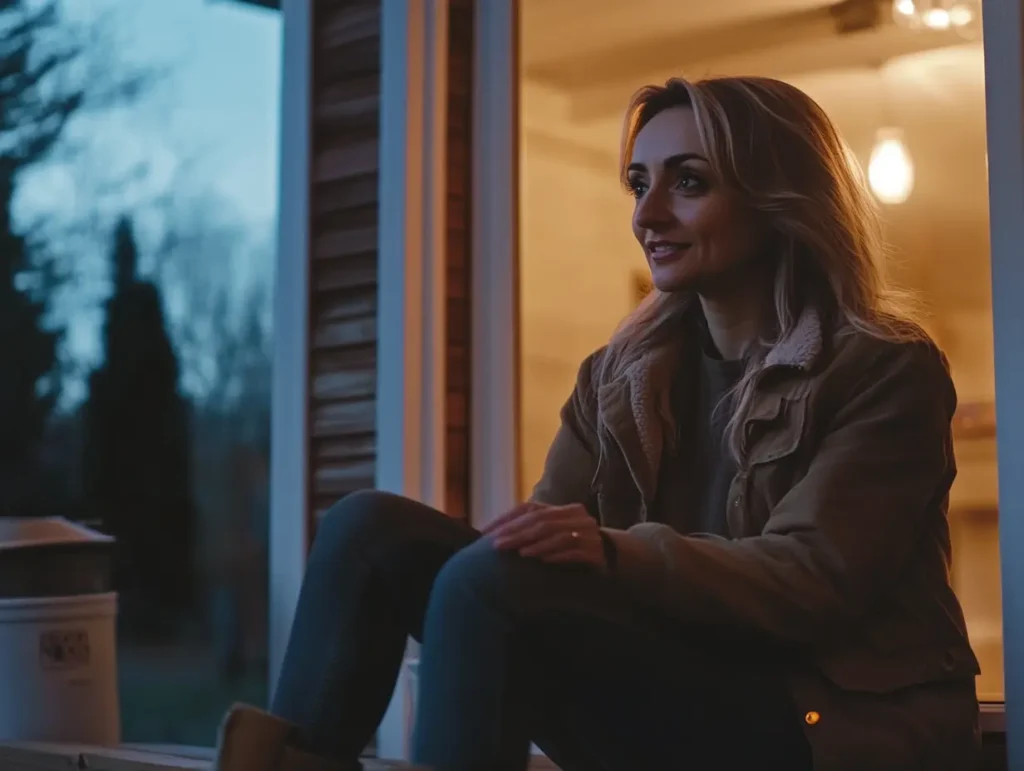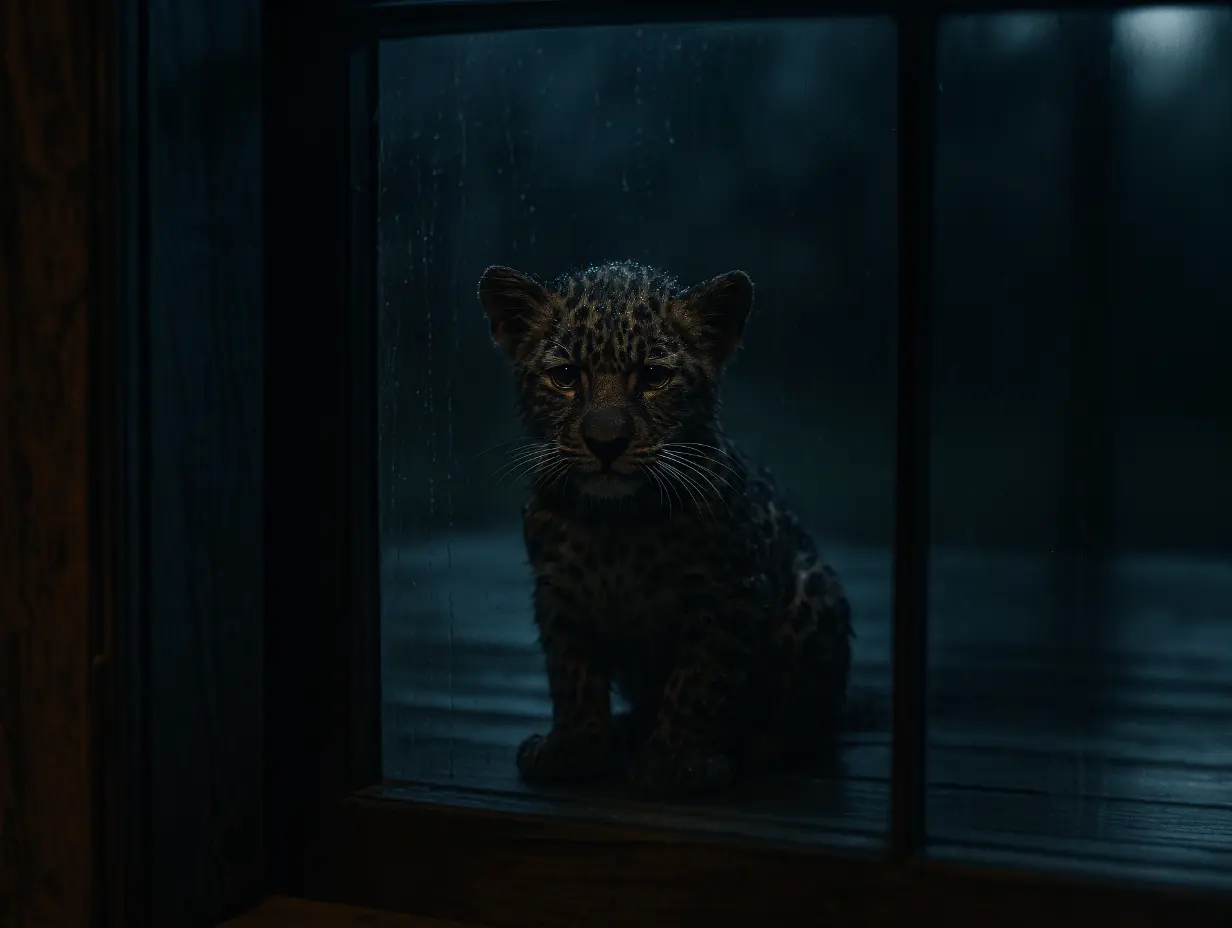The scratching came just before dawn. It sounded faint, measured, almost polite. Catherine’s eyes snapped open. She lay still, listening. Out here, at the edge of the forest, silence had a weight to it, and when it broke, it meant something was close.
The sound came again, a slow drag against glass, as if claws were tracing the outline of her window. She sat up, every nerve burning awake, her breath shallow in the cold air. For a moment, the noise stopped. Then, from outside, came a small, guttural cry.
Catherine crossed the room, each step deliberate, her pulse drumming in her ears. She pulled the curtain back just enough to see, and froze. On her porch, half-hidden in the blue wash of early light, something watched her. Its eyes glowed amber, unblinking. Waiting.
Catherine Morrison woke before dawn, as she often did, not because she wanted to, but because sleep had become a visitor she couldn’t depend on. The nights were long now. Too quiet, too thoughtful.

She lay there for a while, listening to the soft hum of the ceiling fan and the occasional creak of the wooden walls settling. It wasn’t the kind of silence she used to know, the calm that came before a storm or the pause before an animal’s cry.
This silence was heavy. It came from being unneeded. For nearly three decades, Catherine had worked around animals; sanctuaries, rescue centers, transport work for relocations and field clinics. Her life had been noise and motion and urgency.
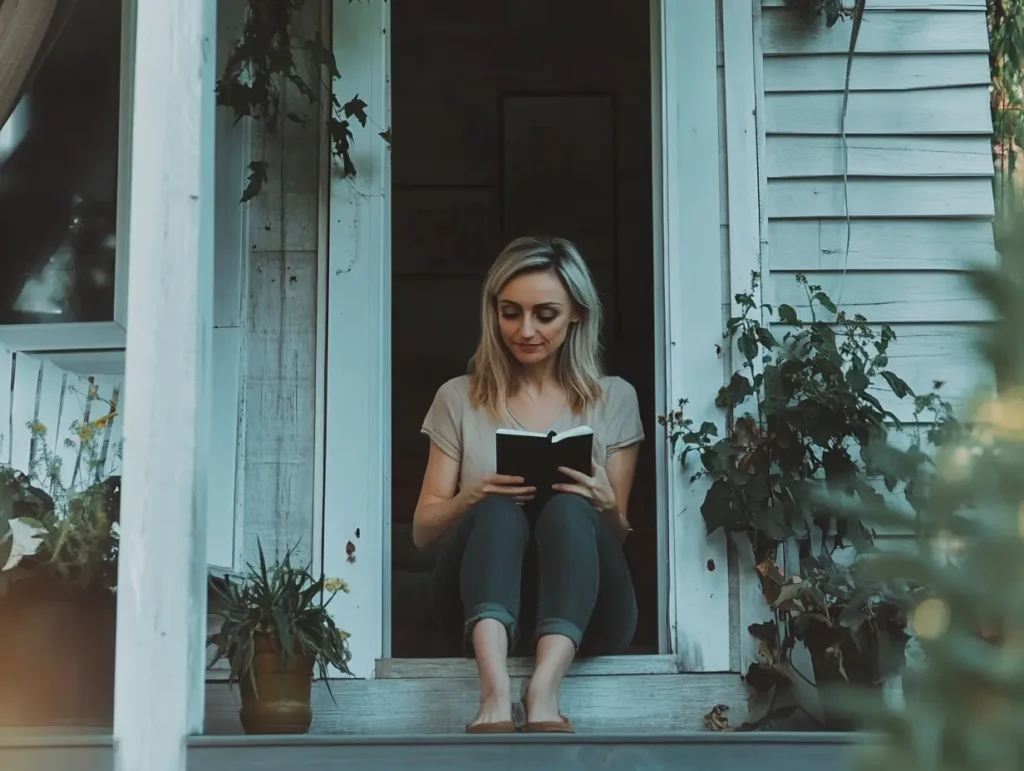
There was always something to do, someone to mend. Now there was only routine: kettle, notebook, garden. She filled her days with small purposes to make up for the loss of the big one.
Her home sat on the edge of a small settlement that had crept too close to the reserve. A thin row of houses meant for people who liked the idea of “living near nature,” but not the reality of it. Most of her neighbors were retirees, families, or city workers who commuted to town.
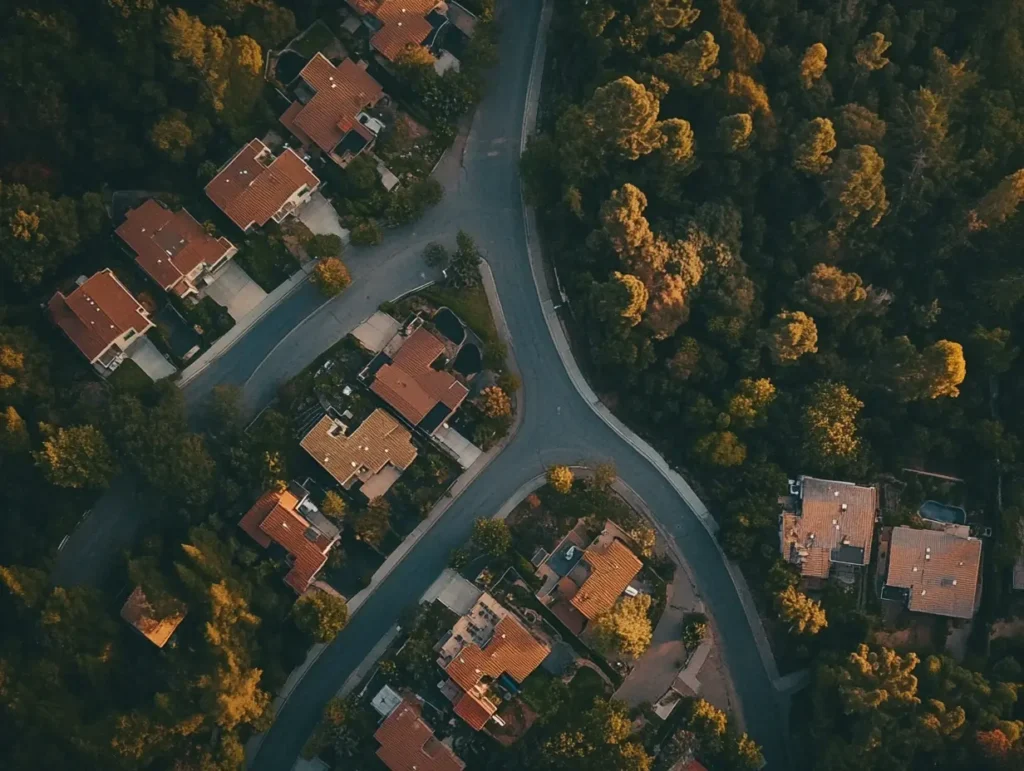
They enjoyed the views, complained about the monkeys, and called animal control whenever a snake crossed their driveway. Catherine didn’t fit in, not really. To them, she was “the animal lady,” the one who didn’t flinch when a monitor lizard wandered into the garden or when a jackal was spotted near the bins.
They would come to her for help. Sometimes it would be a trapped bird, a limping stray, a dog that wouldn’t stop barking at the fence. She always helped. Then they thanked her politely and went back to their own full lives. Catherine stayed behind with the quiet. That morning, she had just reached for the kettle when a sound made her pause.

It was faint, a gentle scratching against the glass door that led to her porch. She frowned, waited. There it was again. She crossed the kitchen, bare feet cool against the tile, and pulled the curtain aside. A leopard cub sat on the porch.
For a moment, she just stared. The small creature was thin, ribs visible. Its eyes were wide but clear, watching her through the glass. The sight of it made something deep in her chest shift, a familiar ache she thought she’d left behind.
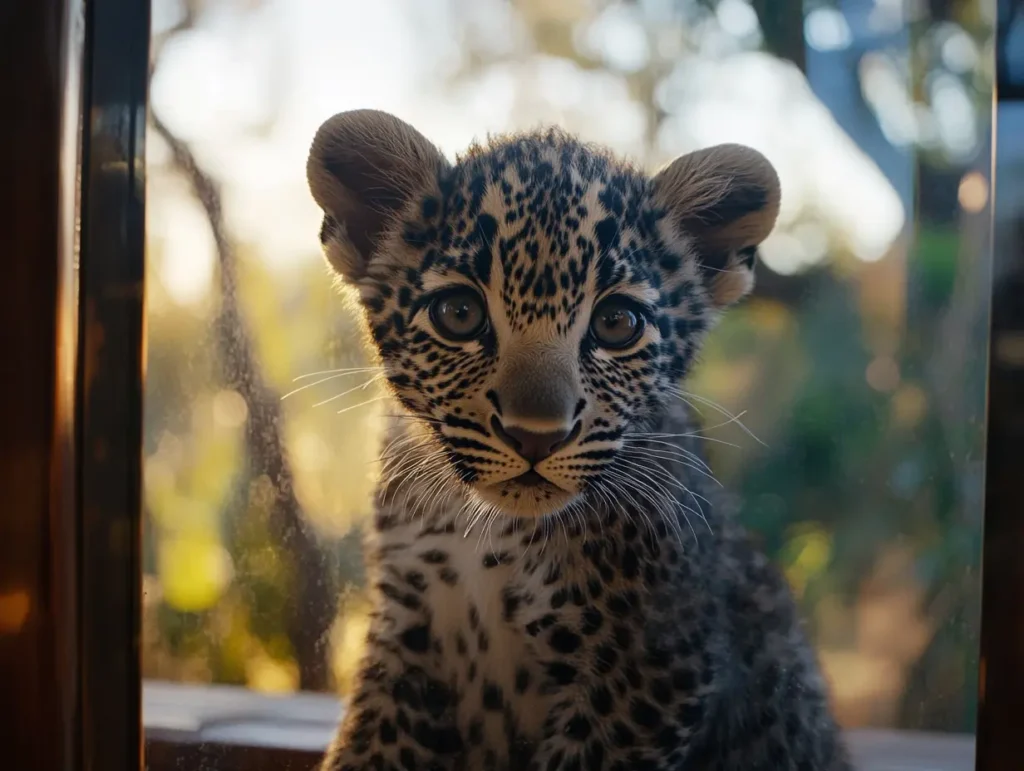
Her first thought was that it was sick or injured. Her second, that it shouldn’t be here at all. A cub that young never strayed far from its mother. She reached for her phone and called the ranger station. “Morning,” said a young voice, distracted. “You said a leopard cub?”
“Yes. Alone. It’s sitting on my porch,” Catherine said. “That’s unusual. It might be separated. We’ll send someone to take a look.” The voice replied. “When?” she asked. “Could be later today. We’ve got a situation out by the east fence.”

Catherine’s eyes flicked back to the window. The cub had shifted into the shade, panting lightly. “Later,” she repeated flatly. “Yes, ma’am.” The line clicked dead. By noon, no one had come. The cub was still there, smaller now in the harsh light.
Catherine hovered by the sink, arms folded, telling herself not to interfere. She knew how these things worked. Feed a wild animal once, and it remembers. Feed it twice, and it learns. Dependence followed quickly after that, and dependency was a death sentence.
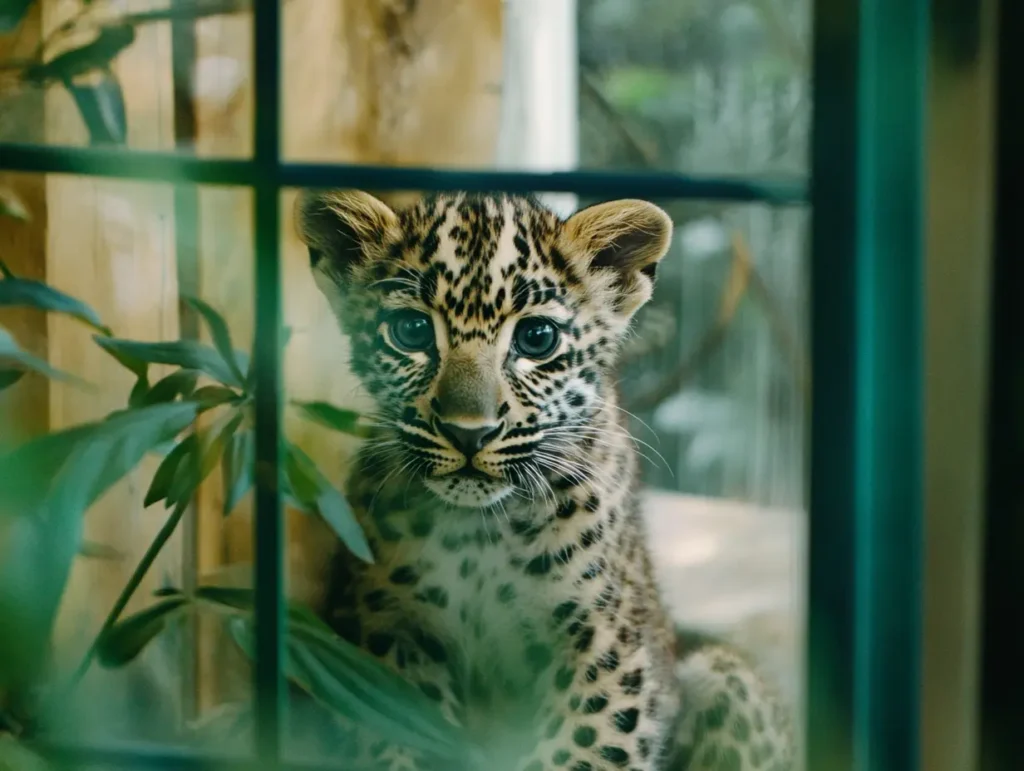
If the cub learned to see humans as safe, it would wander too close to the settlement again. Someone would panic. Someone would call the rangers. And then there would be no rescue, no relocation. Just a report filed, a dart fired, and the problem quietly removed from the map.
She knew all of this, understood it better than most. Helping would only make things worse. If a wild animal began to associate humans with safety or food, it could never be released again. Dependency was a death sentence in disguise.
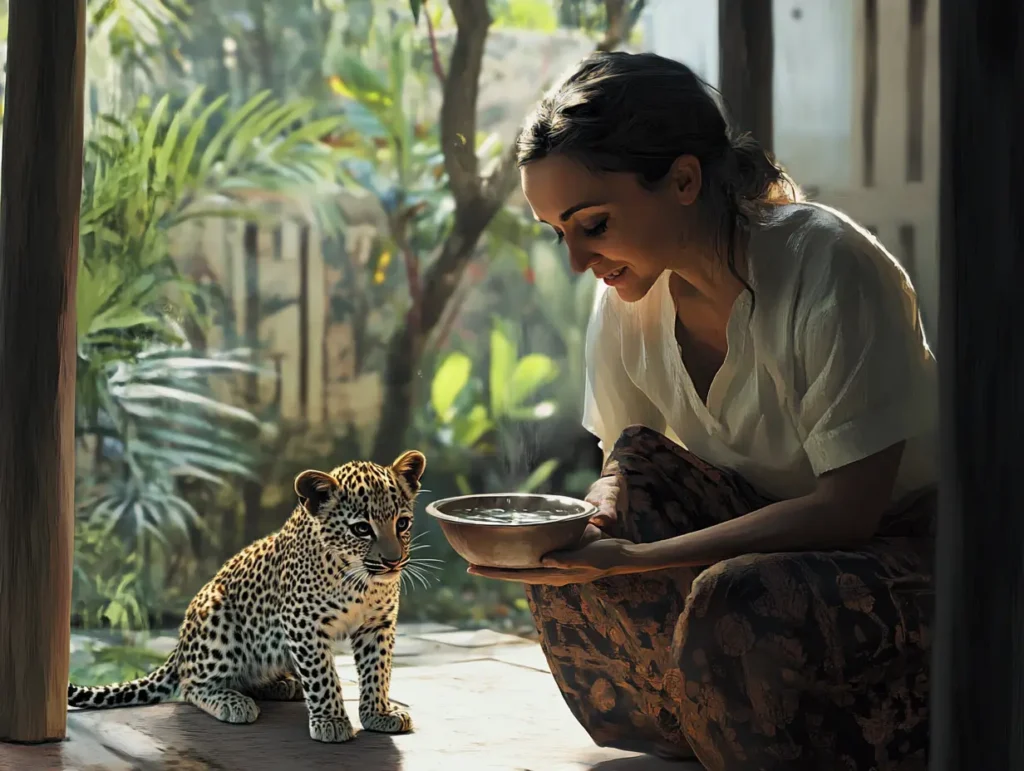
And still, when the cub slumped forward under the weight of the midday heat, her instincts overpowered reason. Catherine filled a shallow bowl from the tap and crouched by the doorway. She slid it outside through the narrow gap and froze.
The cub sniffed the air, hesitated, then padded forward on trembling legs. It drank, fast and messy, water spilling down its muzzle. When it was done, it looked up, eyes glinting gold in the sunlight and in that fragile silence between them, Catherine forgot every rule she’d ever taught.

“You shouldn’t be here,” Catherine whispered. Still, she didn’t close the door. Catherine stayed crouched by the open door longer than she should have, the warm air thick with the scent of dust and dry grass.
The cub licked the last drops of water from the bowl, its small tongue rasping softly against the metal. When it looked up again, her heart pulled in two directions at once. Reason and instinct locked in quiet war. She stepped back, closed the door carefully, and went straight to the phone.

By noon, the rangers arrived in their weathered pickup, the green-and-tan logo barely visible beneath layers of red dust. Two men. Both young, sunburned, calm in the way that came from experience climbed out and greeted her with nods. “Morning, ma’am,” one said. “We got your call about a stray cub?”
Catherine pointed toward the porch. The animal was still there, curled against the wall in a patch of shade. Its sides rose and fell in slow, shallow breaths. “Didn’t touch it?” the ranger asked. “I gave it water,” she admitted. “It was dehydrated.”
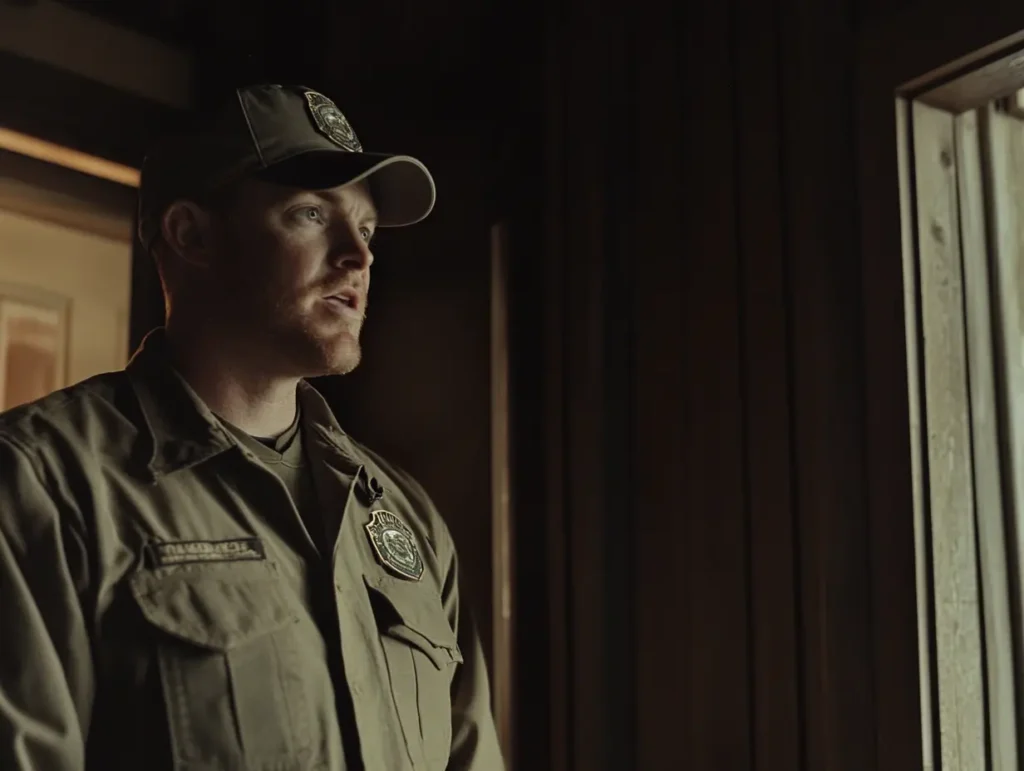
The ranger crouched beside the cub, inspecting it with practiced eyes. “You probably saved it, then. We’ve had a few orphan sightings this month. Could be one that wandered too far from the reserve.” Catherine sighed, “Will he survive?”
“Hard to say. Depends how long he’s been without the mother.” The ranger lifted the cub gently into a carrier, its small body limp but breathing steady. “We’ll get him to the rehab center. They’ll know what to do.”

Catherine watched them drive away, dust billowing behind the truck until it swallowed the road. Only when the sound faded did she realize how quiet her house had become. The rest of the afternoon passed in fits of distraction. She cleaned the kitchen twice, made tea she forgot to drink, sat by the window with her notebook open but wrote nothing.
Every movement of wind outside pulled her attention back to the porch. By evening, guilt had settled into her bones. She told herself she’d done everything right, reported the incident, followed procedure. But it felt like betrayal. Dinner went untouched.

The forest beyond her window shimmered with heat lightning, the kind that flashed without thunder. She poured a small glass of wine, but it didn’t help. She kept thinking of the cub’s eyes not wild, not trusting, but something in between. When she finally went to bed, she left the window cracked open for air.
The forest whispered through the screen: crickets, frogs, the faint rustle of something small in the brush. It was nearly midnight when she woke to the sound. A soft scrape, like claws dragging across wood. At first she thought it was part of a dream, a half-remembered noise stitched into sleep.
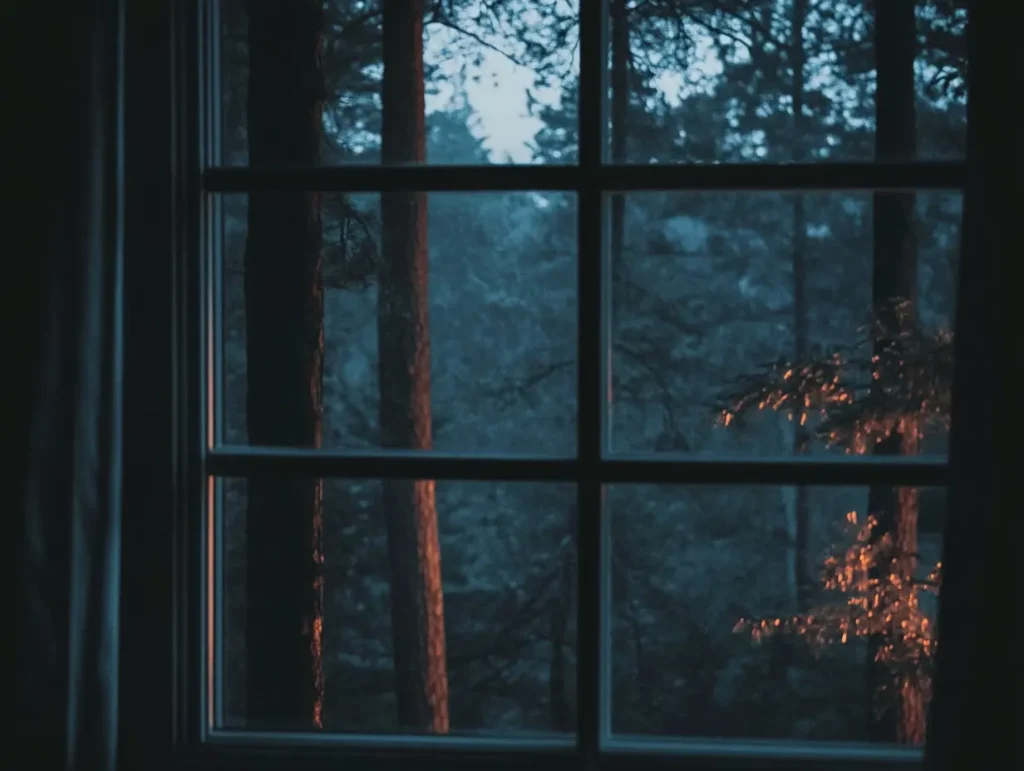
But it came again, deliberate and patient, like something testing the edge of the house itself. Catherine held her breath. The room was silvered by moonlight seeping through the curtains, her old clock ticking faintly on the nightstand. She could feel her pulse in her palms. Another sound followed. A low exhale, a faint shuffle against the steps.
She rose quietly, the floorboards cool beneath her bare feet, and crossed the narrow hall. The air smelled faintly of rain, earth, and something else she couldn’t name. Animal musk, faint but unmistakable. When she reached the living room window, her breath caught. The cub was back.

It sat at the edge of the porch, framed by the soft, colorless light of the moon. Its head tilted slightly as though listening. The small body looked even thinner now, ribs rising with each breath. For a long moment, Catherine just stared. Her mind stumbled between disbelief and fear.
Somehow it had made its way back; through fences, through patrols, across kilometers of open land and forest. She stepped closer, almost involuntarily, until her reflection touched the glass. “How did you…” she whispered. The cub blinked, ears twitching toward the sound of her voice. Then, without warning, it turned sharply toward the trees.
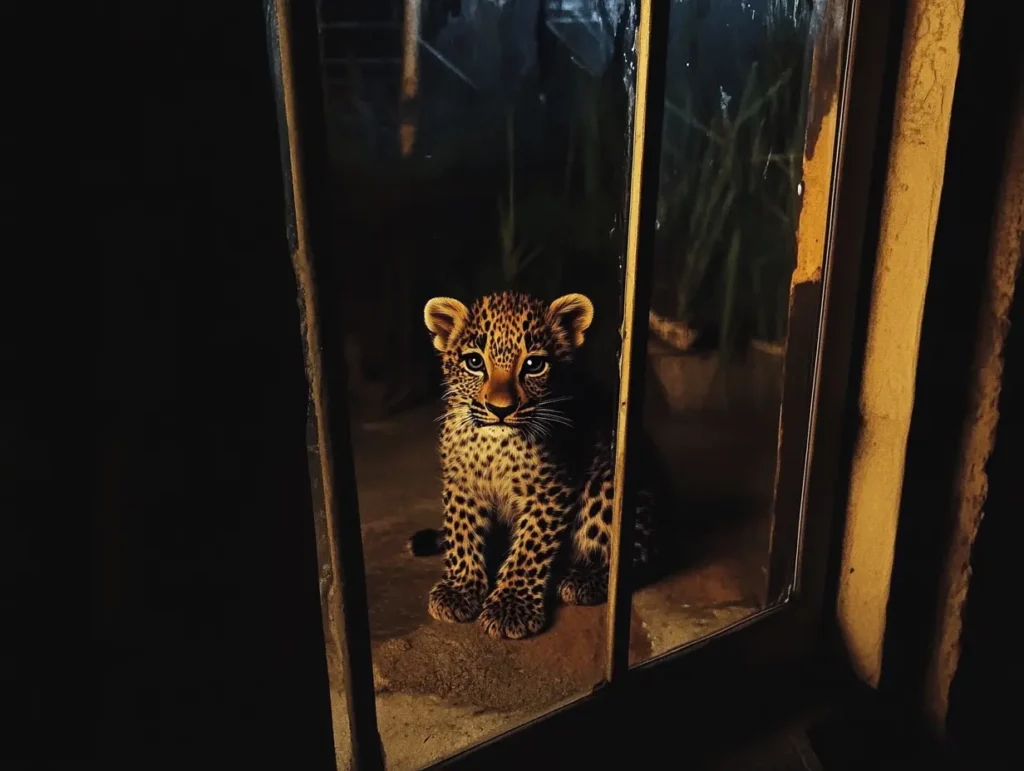
The forest behind it seemed to shift. A faint rustle, heavier than wind. Leaves moved in a slow ripple. Catherine’s skin prickled. That was no small animal. Her instincts took over. She backed away from the window, heart pounding. The mother, she thought. It has to be the mother.
Every rational thought told her the same thing: if an adult leopard had followed its cub here, she was standing in the wrong place. She switched off the lamp, the darkness swallowing her reflection, and locked the door with quiet precision. From the window, she watched.

The cub’s posture had changed, now low and alert. It stared into the trees, muscles tight as wire. A single sound came from the forest, a dry branch snapping under weight. Then, slowly, the cub turned its head toward her again. Its gaze held hers, uncertain, almost pleading.
Then it moved, not toward the forest, not toward her, but sideways, slipping down from the porch and into the grass. Within seconds, it vanished into the dark. Catherine stayed where she was, frozen between fear and curiosity, until the forest stilled again.
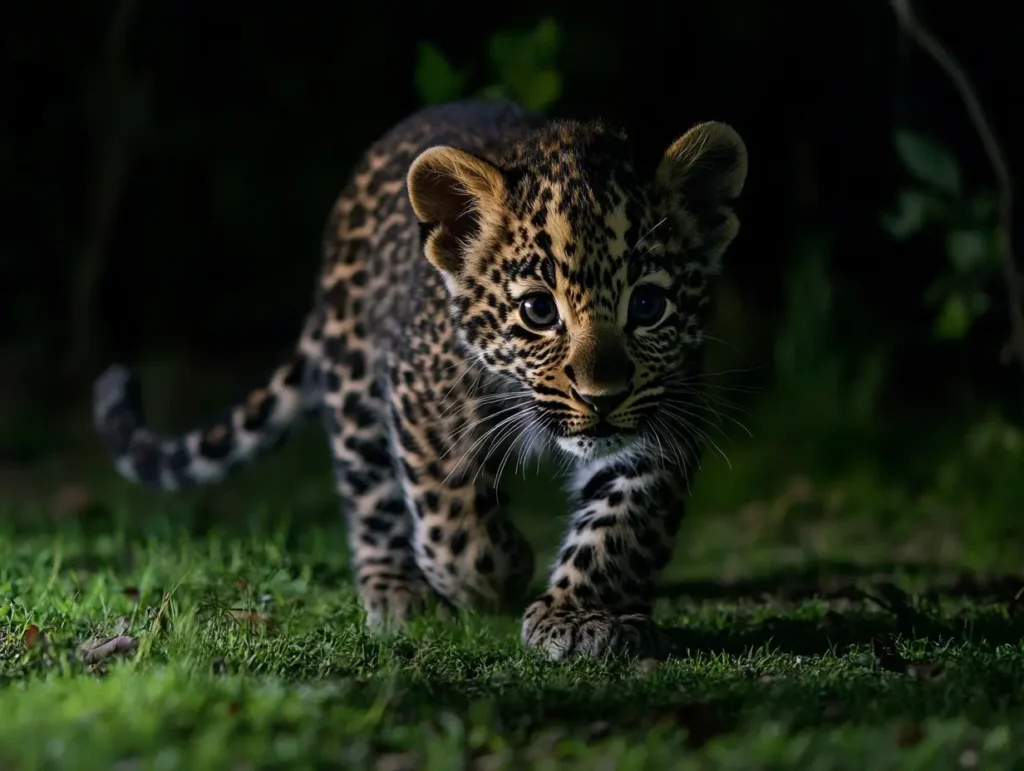
She waited for another sound, a growl, a footstep, anything, but the night only offered back the steady rhythm of crickets. When she finally exhaled, it was shaky and uneven. She pressed her hand to the window glass, cool and trembling under her fingertips. The cub had come back. And something else had been out there.
She didn’t sleep again. She sat in the armchair until dawn, the cup of cold tea still beside her, watching the forest turn from black to gray to green. Every shadow transformed into something harmless until none of it felt harmless anymore.

When the first light spilled across the porch, she rose and checked the steps. No paw prints, no broken boards, nothing to prove that the cub, or anything else, had been there. The quiet mocked her. By seven, she gave up pretending she could let it go. She picked up the phone, thumb hovering over the ranger station’s number.
What would she even say? That a cub had returned twice? That she’d heard something large moving through the brush, something that made her blood run cold? She almost hung up before the call connected. “Wildlife Services, morning.”
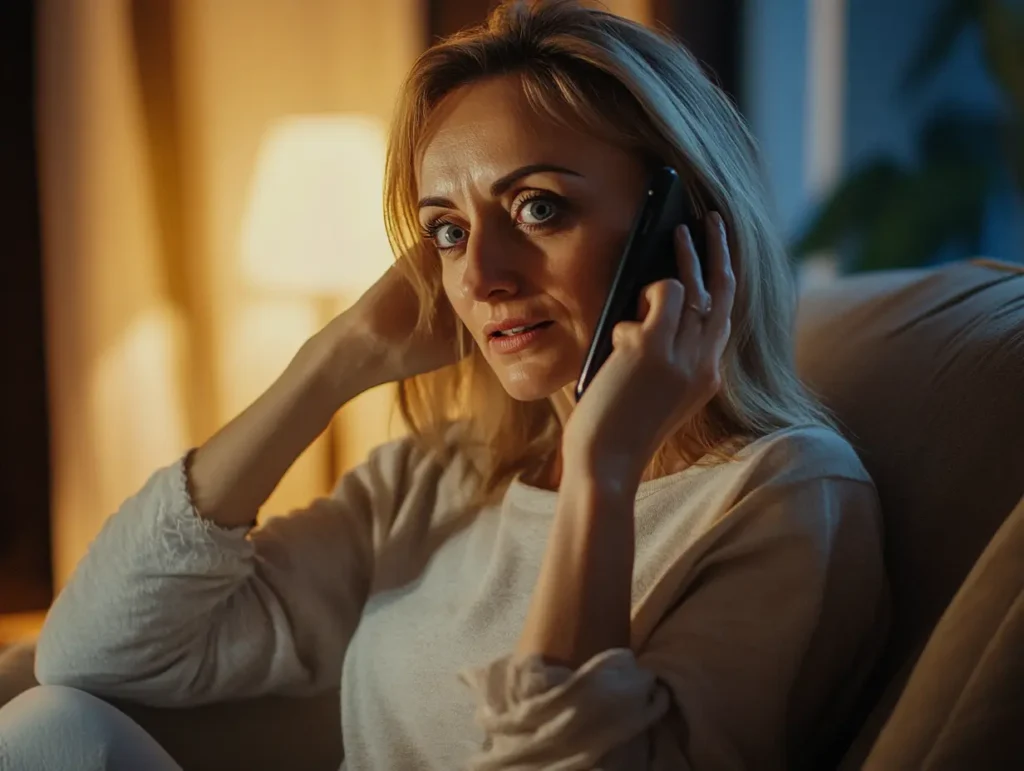
“Hi, this is Catherine Morrison from the southern edge of the reserve road,” she said, clutching the phone a little too tightly. “The cub you picked up yesterday… it came back last night.” There was a pause and then a low voice replied, “That’s not possible, ma’am. We’ve still got that one. He’s at the rehab center eating and resting. Are you sure you saw another one?”
Catherine frowned. “I’m sure. Same markings, same size. It was right on my porch again.” “Then there’s another,” the ranger said after a beat. “Could be from the same litter. We’ll keep an eye out, get a team on rotation near your stretch of the fence.” By midmorning, the same green truck pulled up her road.

Catherine met them at the gate, her robe drawn tight, coffee untouched on the porch rail. The older ranger stepped out, squinting at the treeline. “We didn’t find anything yet, but we’ll keep the traps checked and patrols tighter. If it’s out there, we’ll locate it soon.” The younger one added, “In the meantime, try not to leave food or water out.”
“Even the smell of meat can keep them circling back.” Catherine nodded, though her gaze drifted toward the fence, to the patch of ground where she’d last seen the cub. “It seemed… lost,” she murmured. “That’s the thing,” said the older ranger, glancing toward the houses down the road.
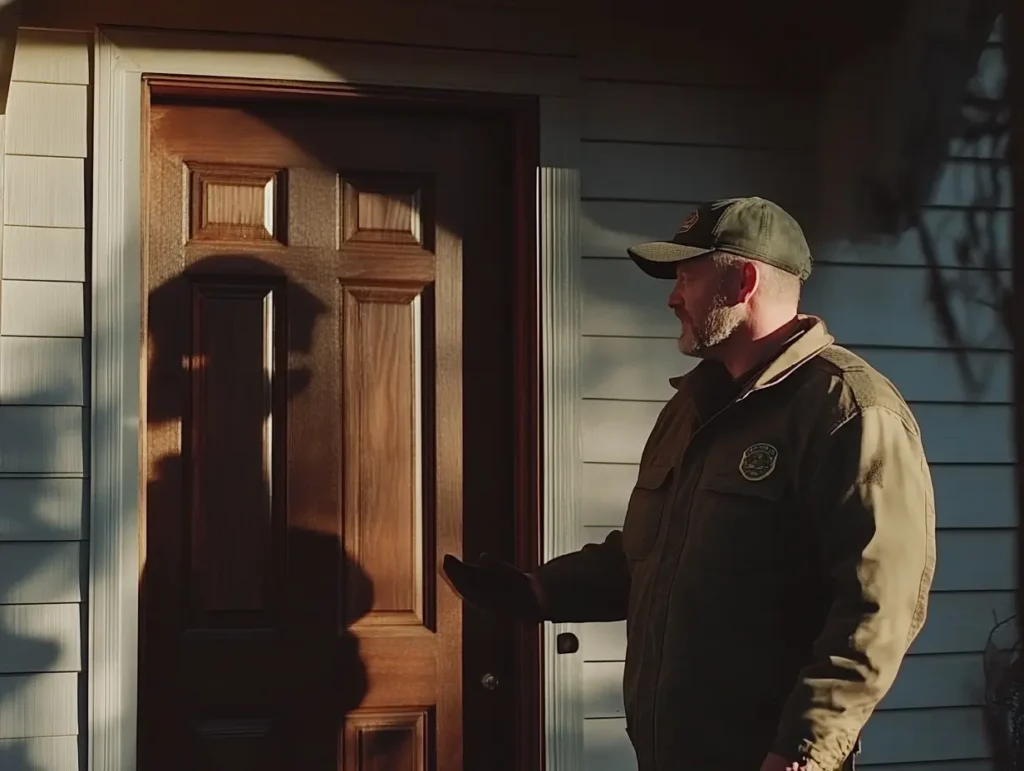
“We’ve had a few calls already. Folks are getting nervous. Pets on edge, kids kept indoors. They’re scared the cub’s going to hurt something or attract something bigger.” Catherine’s brow furrowed. “You think it’s dangerous?”
The ranger hesitated. “Not yet. But if it keeps coming back to populated areas, the department might start seeing it as a safety risk. You know how it goes. Once an animal’s considered habituated…” He stopped short, watching her face.

Catherine finished for him, her voice barely above a whisper. “They put it down.” “Only if there’s no alternative,” the younger ranger said quickly. “No one wants that. But it’s better than waiting for someone to get hurt.”
When the truck finally left, its tires crackling against the dirt road, the quiet that followed felt heavier than before. Something thick and watchful. Catherine stayed on the porch, her eyes fixed on the line where her yard bled into the trees.

If it really was a sibling, maybe that explained everything. The cub wasn’t returning to her; it was looking for its family. The sound she’d heard in the dark, maybe that had been the mother, or the other cub, calling back. The thought refused to let her go.
She slipped on her boots, grabbed her flashlight, and stepped into the morning haze. The forest was cool, damp, and eerily still. No wind, no birdsong. Just her own footsteps. If there was another cub out here, maybe it was hurt, maybe trapped.
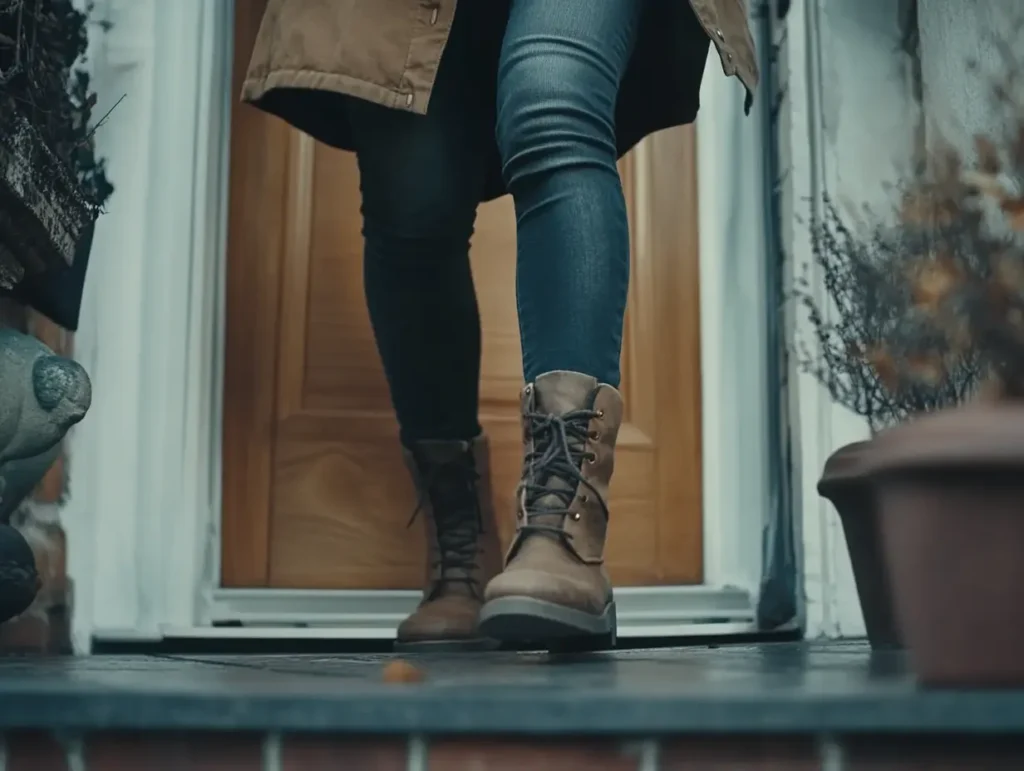
She’d only look for a while, she told herself. Long enough to know where to point the rangers later. But when she crouched near the treeline, studying the soil where the brush grew denser, her breath caught. They weren’t paw prints. They were human.
Catherine froze, her hand hovering just above the prints. They were deep and recent. The soil still soft around the edges. Whoever had made them wasn’t far. She scanned the trees, the morning light slicing through the leaves in narrow bands. Nothing moved. No sound but the low hiss of the wind brushing through the branches.

She followed the trail anyway. The footprints wound between clusters of acacia and thornbush, weaving toward the thicker part of the forest where the air turned cool and dim. Every few steps she stopped, listening, expecting to hear the chirr of a bird or the crack of a branch but the silence stayed heavy, unnatural.
A hundred times she told herself to turn back. To call the rangers, to leave it to someone armed and trained. But the cub’s wide eyes kept flashing through her mind, and the thought of it stumbling through the woods alone pushed her forward. She’d call once she knew what she was looking at, she told herself. Just a quick look, enough to understand.

Then she’d report it properly. The prints deepened as the terrain sloped downward, the soil darker and wet. She brushed a hand against one of the impressions. Whoever had been here had passed within hours. The air grew cooler, carrying a faint metallic tang. Then came the smell: smoke and oil.
Her heartbeat quickened. Through the trees ahead, something broke the monotony of green, a flash of canvas, the muted glint of metal. She crouched low, moving between the trunks until the clearing came into view.
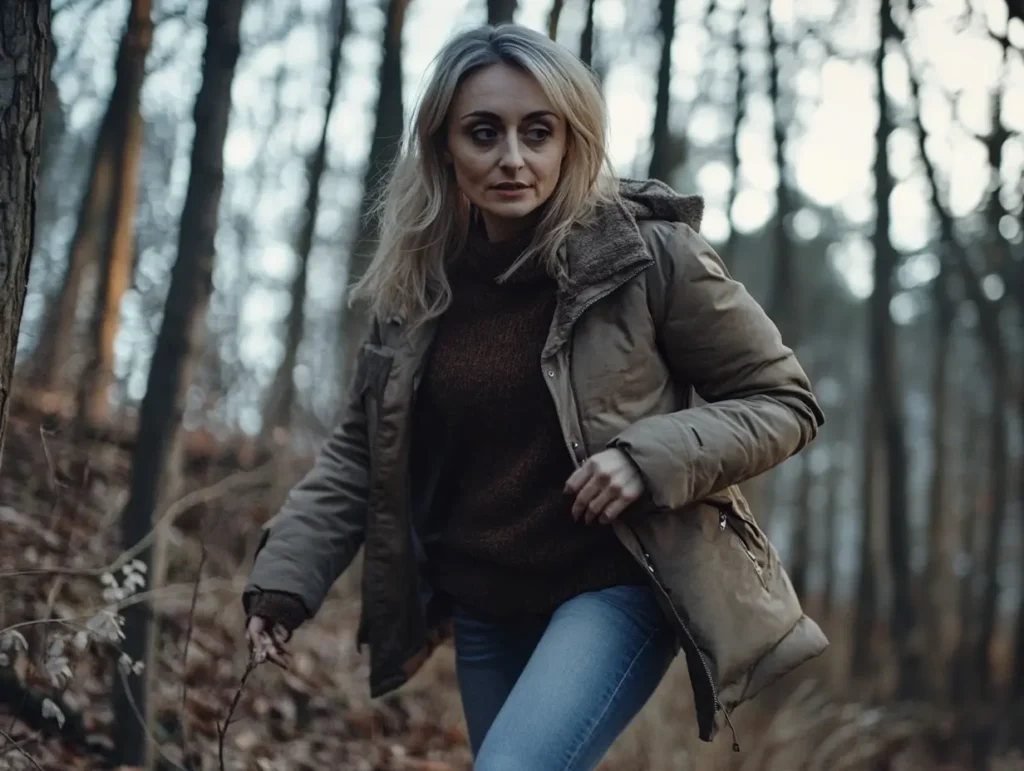
A small camp. Crude, but recent. A tent half-collapsed beside a dead fire. A length of rope. A lantern hung from a branch, still swaying. She inched closer, breath shallow, until the details came into focus. A cage.
It stood half-hidden under a camouflage net, crudely welded from metal bars, its door secured with a thick padlock. Inside, sprawled on its side, was a leopard. Its coat, once gold, was dulled with dust and dried mud. The slow rise and fall of its ribs told her it was alive but weak.
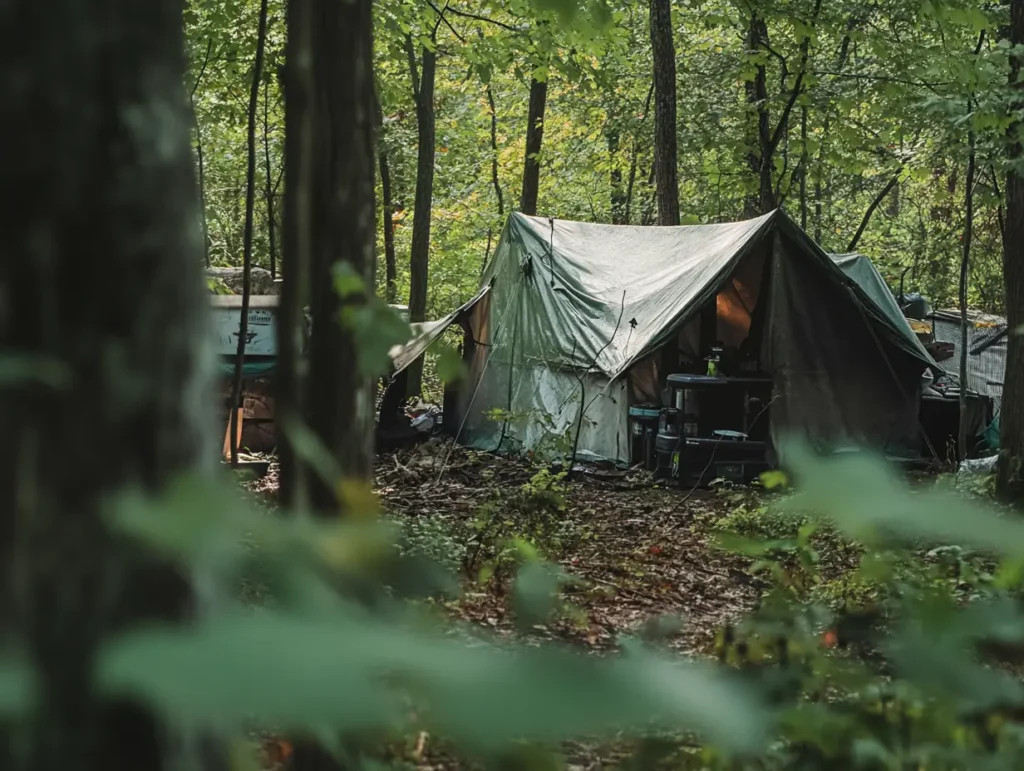
Catherine’s throat went dry. The cub hadn’t been wandering. It had been coming back because it couldn’t find this. She scanned the clearing again. No sign of movement from the tent. A single camp chair lay tipped over, a jacket thrown across it. Whoever was here could return at any moment.
Her pulse pounded in her ears. She could call the rangers now but by the time they arrived, the poachers might be gone, and the leopard too. She moved toward the cage, her steps slow, deliberate. The smell of rust thickened in the air. The leopard’s eyes flickered open, meeting hers through the bars.
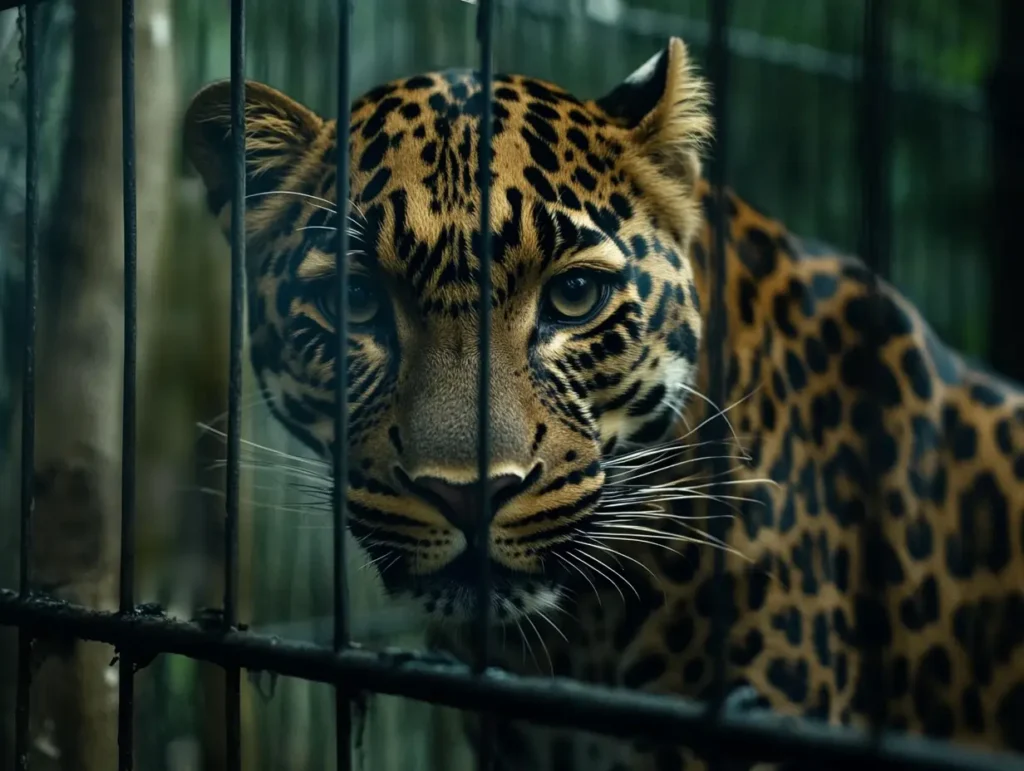
“I’m going to get you out,” she whispered, voice trembling. She dropped to her knees, searching for the latch. The lock was thick but old, the kind meant for intimidation more than security. Her fingers brushed the cold metal. If she could just pry it open, just enough for the door to swing free.
A sound split the stillness. A footstep. Behind her. Catherine froze. The sound came again more deliberate, heavy and far too close. She turned slowly. A man stepped out from behind the tent, his face half-covered with a faded scarf, the rest shadowed by the dim light. His eyes found hers instantly. Sharp, calculating.
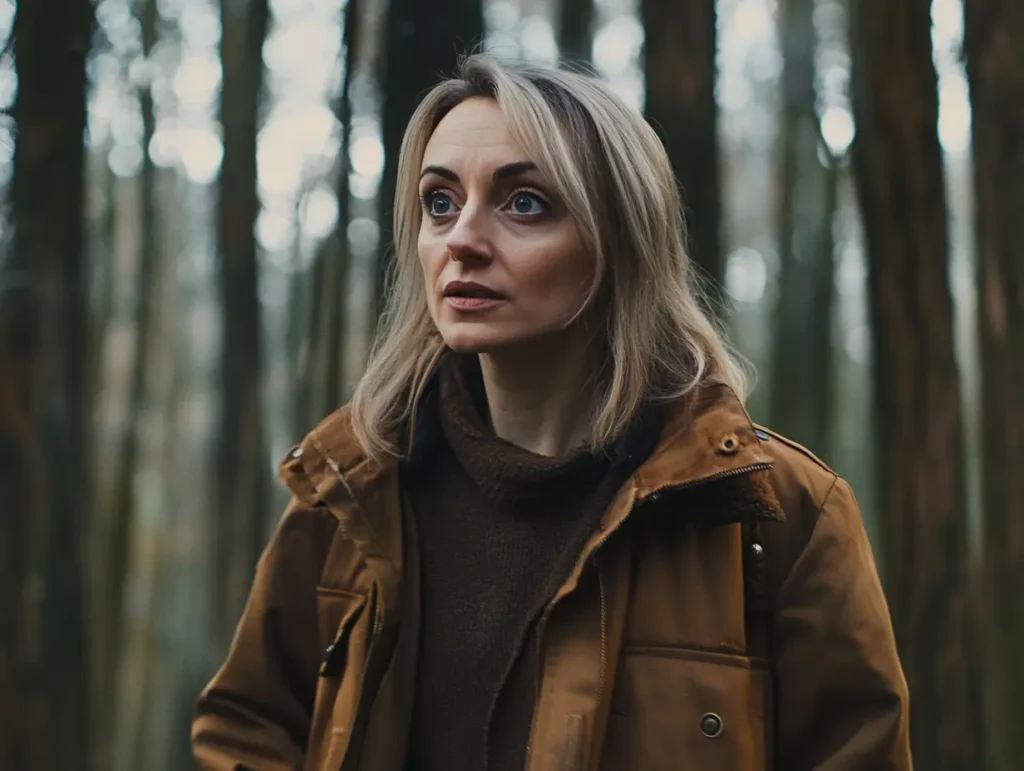
“So it’s you,” he said, his voice low and even. “The woman from the yellow house.” Her heart stopped. “What?” He tilted his head slightly, studying her. “Did you think I wouldn’t notice? Out there leaving scraps for the cub, calling the rangers every time it wandered back. You made it easy to find.”
Catherine’s pulse quickened. “You’ve been watching my house?” He shrugged, the gesture casual and chilling all at once. “Had to. That cub’s worth more alive than dead, but it kept slipping back to you. You’re the reason I’ve been wasting nights out here.” Her stomach turned. “You trapped its mother.”
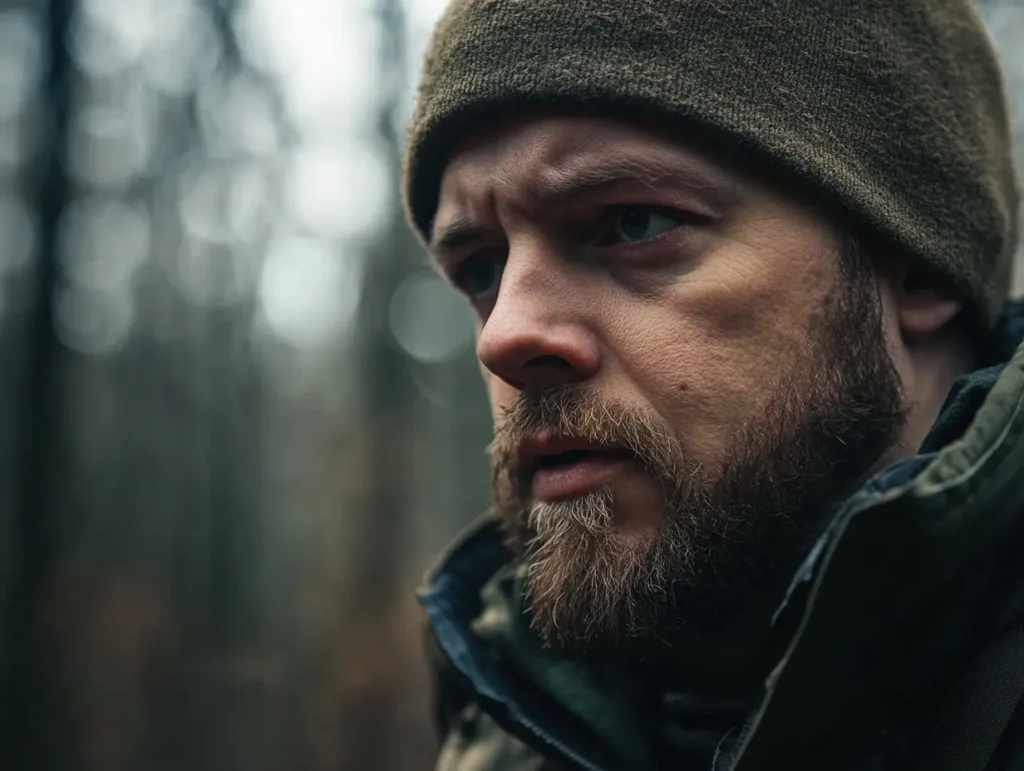
“She’s insurance,” he said flatly. “You, on the other hand, are a complication.” The leopard stirred inside the cage, a deep rumble rising from its throat. The sound made the man’s expression tighten. “Easy,” he muttered, glancing toward the bars. “You’re not going anywhere.”
Catherine’s fingers brushed the cold metal of the lock. Her mind screamed to run, but her body wouldn’t move. “You should head home, lady,” he said, stepping closer, voice lowering to something almost conversational. “Forget this, and no one gets hurt.”
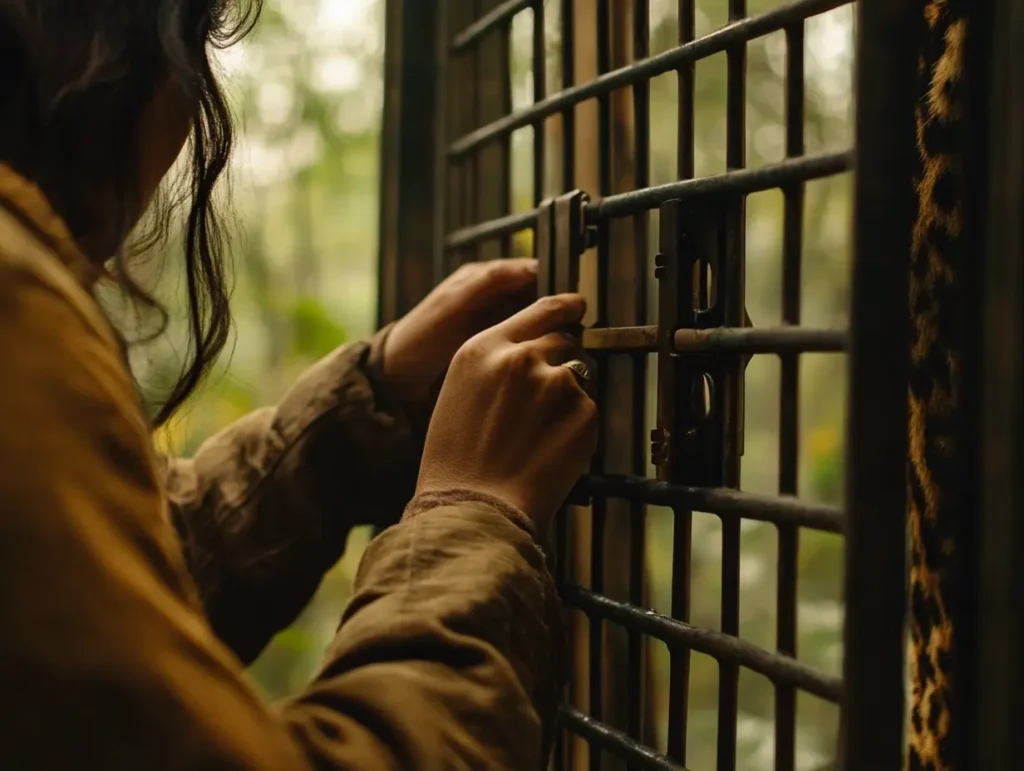
The leopard growled again, louder this time, its eyes wide and fixed on Catherine or maybe the man behind her. He turned slightly, distracted for just a second. It was enough. Catherine pulled at the padlock. The metal groaned, then clicked open. The cage door shuddered, swinging outward.
A blur of motion exploded between them, the leopard leaping free, landing hard, tail lashing. The man stumbled back, shouting in shock. Catherine ran. Branches whipped her arms, her breath coming fast and shallow. Behind her came the sounds of chaos a shout, a crash, a growl that seemed to shake the ground. Then another sound came closer.
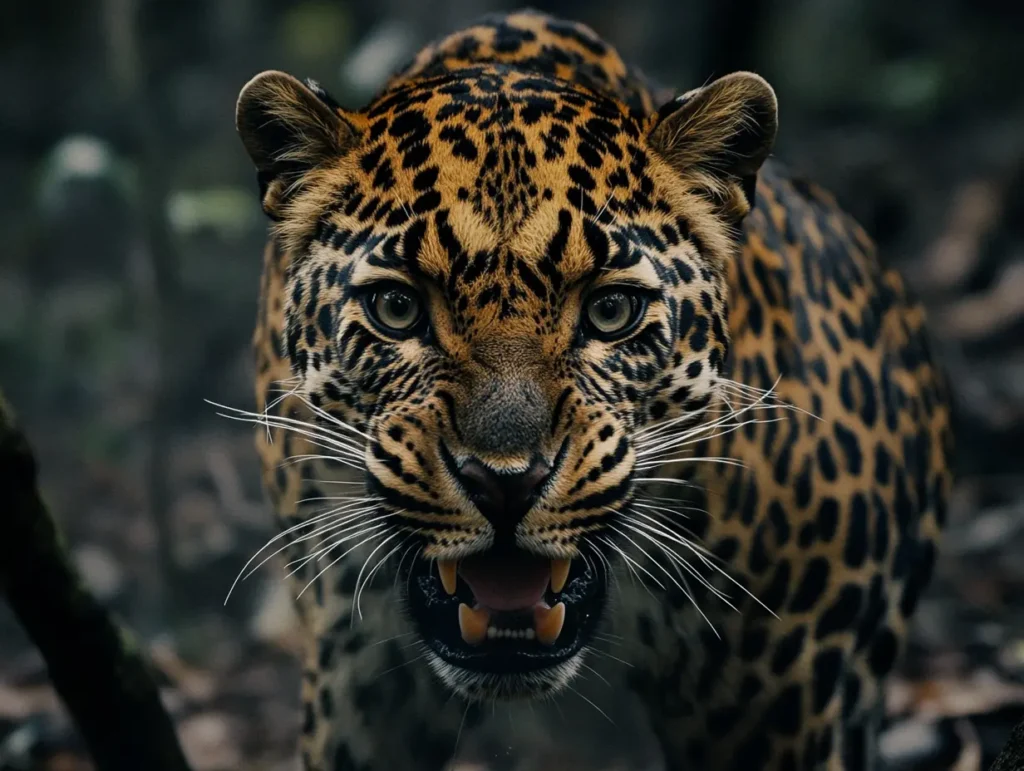
She glanced over her shoulder. The leopard was following. It burst through the undergrowth like living fire, eyes wide, muscles rippling with confusion and fury. Its ears were flat, tail lashing, the primal language of a creature that no longer knew who to trust.
Catherine closed her eyes. She didn’t scream. She just whispered, “Please.” A new sound split the air, a sharp, desperate cry. The cub. It came bounding out from the trees, small but fearless, planting itself between Catherine and the adult leopard.
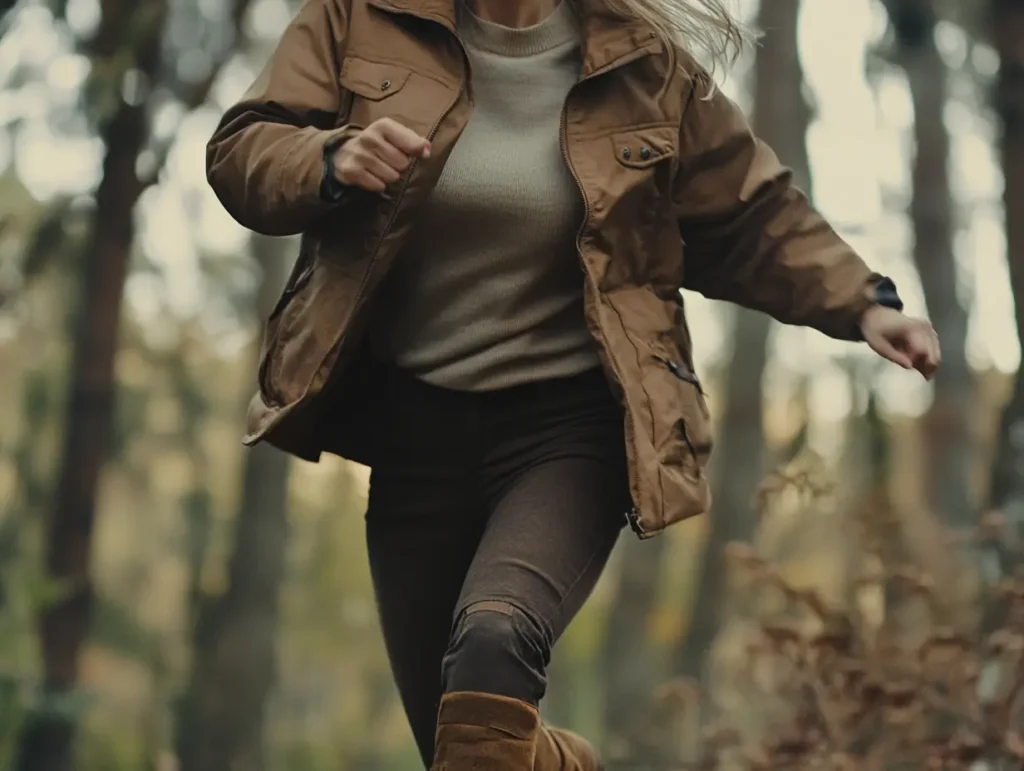
Its tiny body trembled, yet the sound it made was a shrill, high-pitched snarl that carried enough defiance to freeze the world. The larger leopard hesitated. It turned its head slightly, recognition flickering across its gaze. The growl faded to a confused rumble.
Catherine stayed still, barely breathing. The cub chirped again, softer this time, that same plaintive sound she’d heard at her door. The mother answered with a low, guttural sound that was half-warning, half-relief.
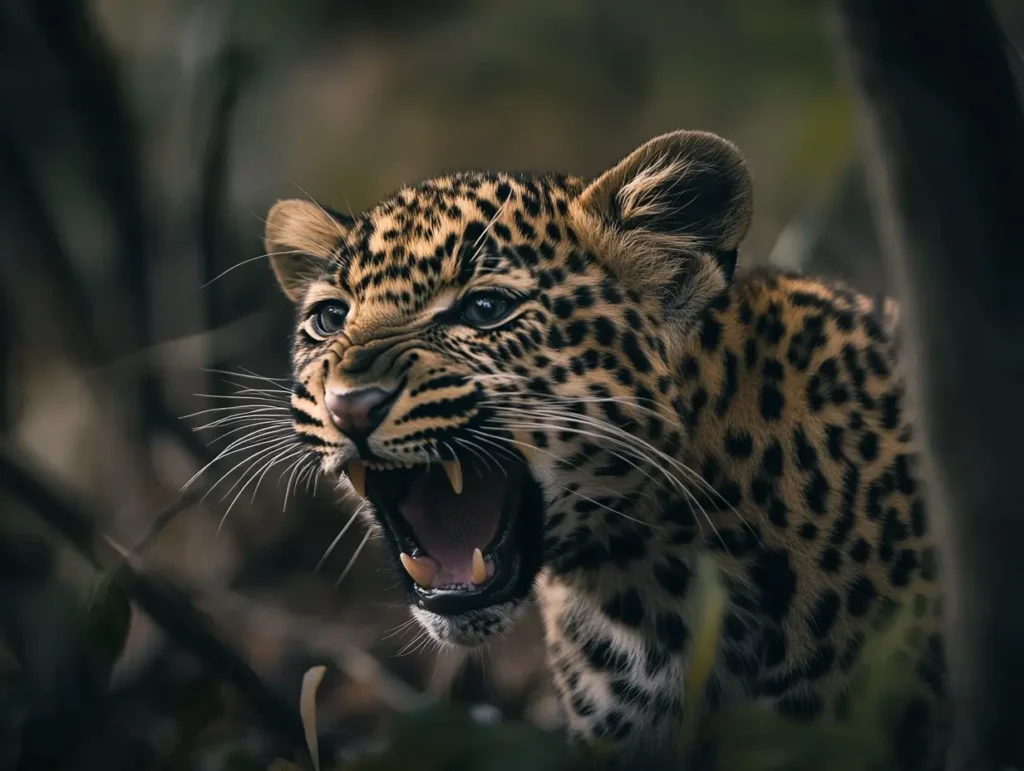
Slowly, impossibly, the tension broke. The mother lowered her head, sniffing the cub, pressing her nose gently to its fur. Catherine swallowed hard, watching as realization dawned on her. The cub hadn’t been lost at all. It had been trying to find her.
The leopard turned toward Catherine one last time, eyes gleaming in the filtered light. Then, with the cub pressed close to her side, she slipped into the forest and was gone. For a long time, Catherine didn’t move. Only when the forest sounds returned: birds, wind, the faint trickle of water, did she realize she was still alive.
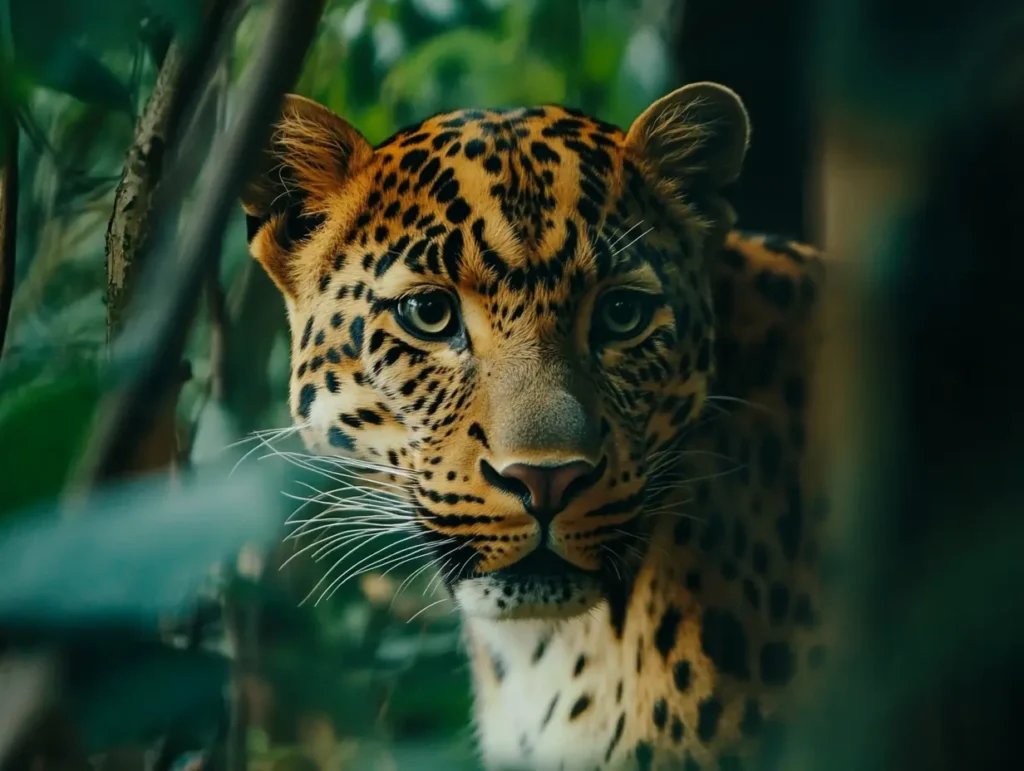
By the time Catherine found her way back home, the sun was bleeding through the trees, a thin orange light that made everything look unreal. Her hands were scraped, her shirt torn. Every sound made her flinch.
She called the rangers the moment she reached her porch. Her voice shook only once. They arrived within the hour, two trucks, four men, radios crackling. Catherine stood in the doorway as they fanned out toward the forest, recounting what she’d seen: the cage, the camp, the leopard, the man.

The rangers exchanged uneasy looks. “We’ve had reports of poachers near the southern fence for a while,” one of them said. “It seems you walked right into one of their camps.” Catherine’s stomach tightened. “Did you find them?”
“Not yet,” the lead ranger replied. “But the site was cleared. Whoever was there ran as soon as we got close.” His gaze shifted toward her, steady but not unkind. “You were lucky, Ms. Morrison. What you did was dangerous. Next time, please call us before you go investigating something like that.”

“I thought I did,” she said quietly. He sighed, rubbing the back of his neck. “Afterwards, yes. But you should never have been anywhere near that trap. That leopard could have turned on you, and those men could have done worse.” Catherine said nothing. Her hands trembled slightly as she crossed her arms.
The ranger’s tone softened. “Still, you probably saved it. If you hadn’t called when you did, we might have been too late.” She hesitated before asking, “What about the first cub? The one you took in earlier?”
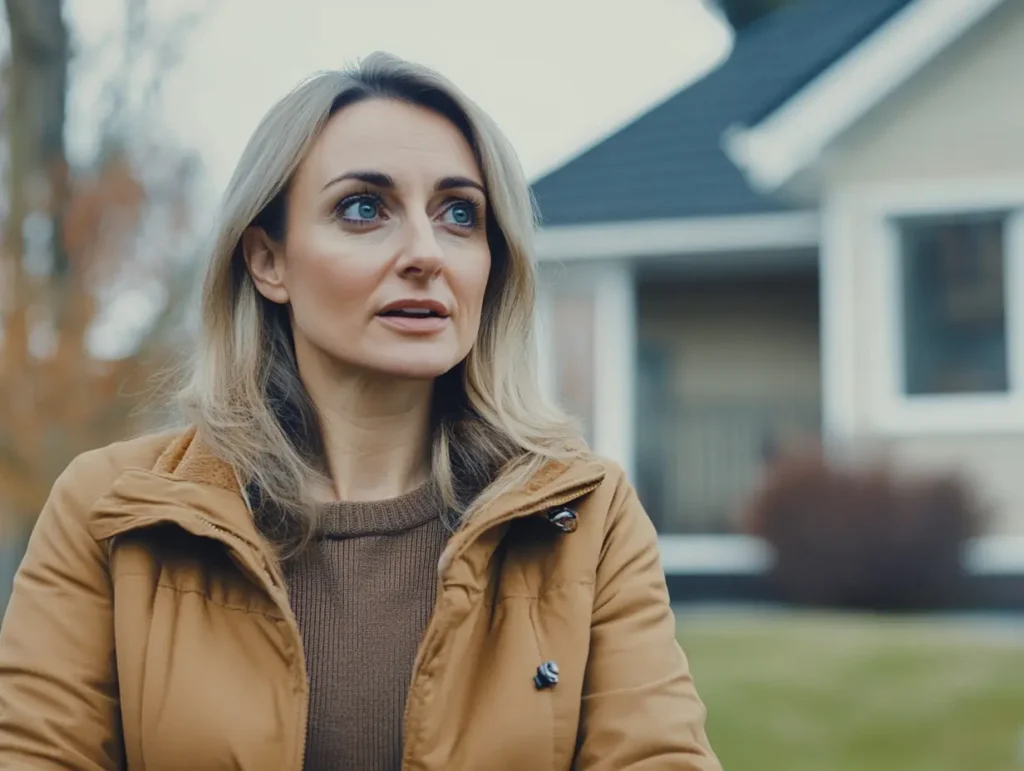
“He’s still at the rehab center,” the ranger said. “He’s doing well. Once he’s strong enough, we’ll release him into the same area. If the mother stays nearby, they should find each other naturally.” Catherine nodded slowly. “And the one I saw last night?”
“We haven’t spotted it again,” he said. “But our patrols are keeping an eye on the hills. The mother’s strong enough to look after it, and that’s a good sign. If she’s alive and moving, the rest will fall into place.”
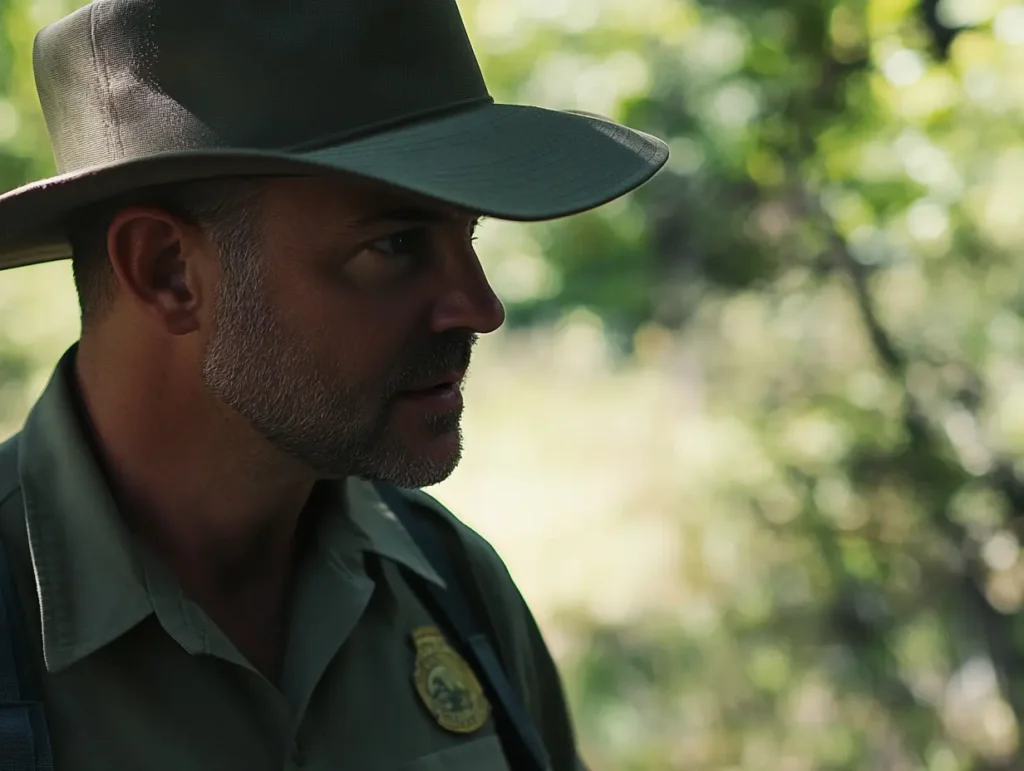
Catherine exhaled slowly. “Good,” she whispered. “That’s good.” The ranger tipped his hat. “Try not to make a habit of this, Ms. Morrison. Leave the rescues to us next time.” When they left, the silence that followed felt deeper than before. That evening, Catherine sat on her porch as dusk settled over the settlement.
The forest stretched before her, vast and dark, filled with unseen life. Somewhere beyond those trees, a mother and her cubs were free again, alive because she had not turned away.She watched until the first stars appeared in the sky. For the first time in years, the quiet around her did not feel lonely. It felt like peace.
